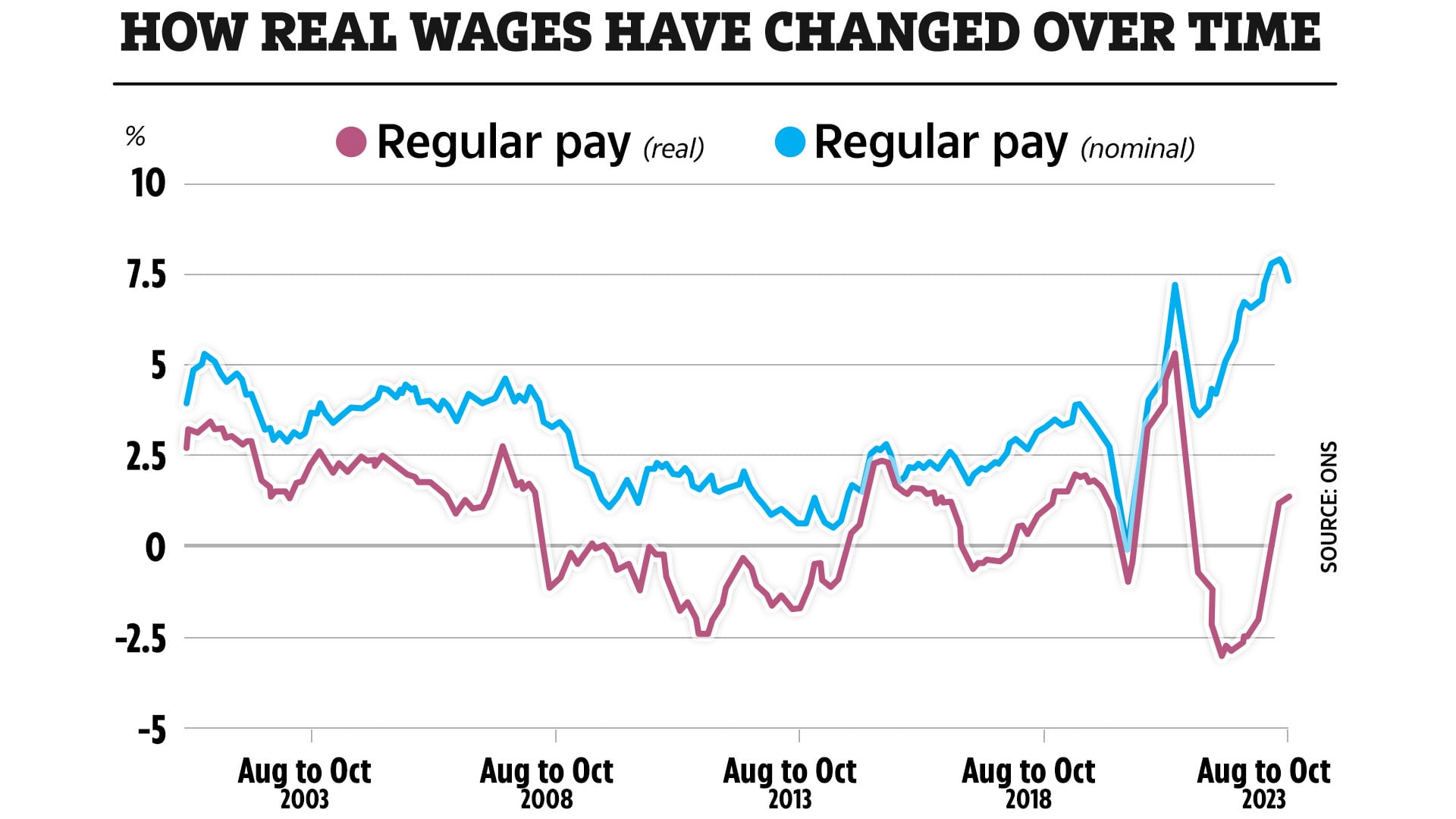WAGES are still rising for millions of workers as earnings continue to outstrip inflation.
Official figures released today by the Office for National Statistics (ONS) reveal regular pay, excluding bonuses, stood at 7.3% in the three months to October this year.
The rate of UK unemployment also remained unchanged at 4.2% in the three months to October, the ONS said.
This was down from the previous quarter when wage growth stood at 7.7% in the three months to September this year.
But taking into account inflation, which measures how much prices are rising, wages increased by 1.3%.
A growth in wages is good news for millions of workers who have been battling against high inflation in recent months.
Read more in money

Warning over 'drip pricing' at checkout that could trick you in to spending more

Final date to send your Christmas post by – or risk presents not arriving
The annual rate at which prices rise was 4.6% in the year to October, down from 6.7% in September.
It means Prime Minister Rishi Sunak has hit his target to halve inflation, a promise he made at the beginning of the year amid the cost of living crisis when the rate had hit 10.7%.
Commenting on today's figures, ONS director of economic statistics Darren Morgan said: "While annual growth in earnings remains high in cash terms, there are some signs that wage pressure might be easing overall.
"However, as inflation has been falling more quickly, pay continues to grow in real terms."
Most read in Money

Full list of codes on payslips that reveal if you’re owed cash – get £2,585 back

Benefits to arrive early ahead of Christmas as payment dates revealed

Shoppers rush to buy 59p Quality Street chocolate from little-known supermarket

I made Xmas dinner in an air fryer – a crucial part was bitterly disappointing
If pay rises by less than inflation it squeezes income, leaving people worse off.
Inflation is a measure of how much goods and services are worth in a given period.
But wages are now rising faster than prices for the second time since September 2021, easing pressure on hard-up households.
Meanwhile, today's figures also show growth in average total pay, which includes bonuses, was 7.2% in August to October.
Rising wages have previously been blamed for keeping inflation high by Bank of England bosses.
The Chancellor of Exchequer, Jeremy Hunt said: "It's positive to see inflation continue to fall and real wages growing.
"At the Autumn Statement, I announced an ambitious set of measures to get more people into work and boost economic growth.
"This includes a significant expansion of health support and an over £9 billion per year tax cut for employees and the self-employed, worth over £450 for the average worker."
What it means for your money
Growth in wages is good news for millions of workers who have been battling against high inflation in recent months.
Alice Haine, personal finance analyst at Bestinvest, said: "A rising real wage technically delivers a boost to workers’ standard of living as it means the money they earn can stretch further, though it is important to note that the rise is an average and does not mean the cost of living challenges are easing for everyone."
While high wage growth can ease the pressure off households it does run the risk of fuelling inflation if businesses pass on that cost to customers by increasing the price of goods and services.
This would add extra pressure to household budgets at a time when energy prices are under threat from geopolitical tensions and rising demand as the colder weather sets in.
Alice added: "Headline inflation is expected to drop below 5% for the first time in two years when the October figures are released on Wednesday – delivering a boost to Prime Minister Rishi Sunak who made a pledge in January to halve inflation by the end of the year."
Rising wages have previously been blamed for keeping inflation high by Bank of England bosses.
The Bank’s Monetary Policy Committee (MPC) held the base rate at 0.25 percentage points to 5.25% earlier this month.
This was the second time in a row that the bank decided to hold the base rate, easing pressure on homeowners facing rising mortgage rates.
Interest rates could be cut by the Bank of England as soon as May, experts are now predicting.
Analysts at Wall Street financial services giant Morgan Stanley said falling energy costs will bring down inflation — paving the way for reducing the current high of 5.25%.
The US bank predict rates could be a full point down to 4.25% by the end of next year.
High-street banks use the BoE base rate to work out the interest rates it offers to customers.
Read more on The Sun

Molly-Mae breaks silence on Instagram after split rumours with Tommy Fury

I'm A Celebrity voting percentages revealed as Sam Thompson wins jungle crown
A hike means the cost of borrowing, including loans, credit cards and mortgage repayments become more expensive.
Source: Read Full Article

